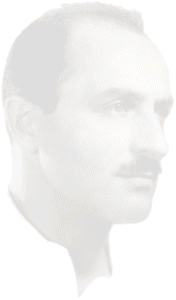
| NO FOR AN ANSWER (1937-40) |
| First Performance | |
| New York, Sunday, January 5th 1941 (Semi-staged concert version) | |
| First Staged Performance | |
| San Francisco, October 22 2001; American Conservatory Theater |
"After I finished it [The Cradle Will Rock], I wanted my next work to try to develop real people, very much themselves, with special personal qualities. I wanted to try characterisation in depth and in musical terms. So I set about writing and composing No for an Answer "
With these words in his mind, and fired by the success of The Cradle Will Rock, and his newly found raison d'etre as a composer of the Left, Blitzstein set to work on a new piece in which he could expand and develop the style of The Cradle. He described the projected work in 1937 as a piece that "will range between satire and realism, and will comprise both burlesque and tragedy. Difficult as all **** to do, but worth it if successful"
His sister Jo described the events that fired the conception of the piece. Between 1936 and 1939, she was living in Ventnor, New Jersey, and Blitzstein had spent part of a cold winter with her there. "We actually spent a great deal of time with two Greek cooks and a whole coterie of bright workers who were trying to better their conditions. When Marc got back to New York and began to work on this idea, one of the things that must have struck him forcibly was the rather pathetic role people like us (middle-class intellectuals) played in the lives of these people. In the end they were of more use to us than we to them."
At this stage, it seemed likely that the piece would be produced by the newly-formed Mercury Theatre, created by Houseman and Welles out of the ashes of Project 891, with Orson Welles as the director. Indeed, in February 1939, Blitzstein signed a contract with the Mercury Theatre for a production of No For An Answer. But it was not to be. Welles left for Hollywood to make Citizen Kane, nominally under the aegis of the Mercury Theatre, but, in reality, Welles' trip to California was the death knell for the theatrical future of the company.
Nevertheless, Blitzstein sporadically continued work on No For An Answer through 1939. The summer was spent in Yaddo, New York, alternating concentrated daytime work on the opera with a hectic night life in the company of his friend David Diamond.
By September however, the political situation in be outside world was praying heavily on Blitzstein's mind. In particular the so called Hitler-Stalin pact caused Blitzstein considerable distress in trying to justify the actions of Stalin (who Blitzstein revered) with his situation as a Jew, and his awareness of the purges in Germany.
The furious activity that had characterised the composition of The Cradle Will Rock was thus in complete contrast to the lethargic process in which Blitzstein engaged in the writing of No For An Answer. Perhaps a piece of agitation has to be written in the white heat of fury and creativity. Certainly Blitzstein was finding that the protracted period was causing him increasing difficulties in simply declaring the opera complete. During the three and a half years it took Blitzstein to complete the opera he wrote, rewrote and discarded more music than he was ever to do on any other project. In all he felt that he must have written nearly six hours of words and music for the piece!
In December 1939, Blitzstein previewed the title song of the opera at a benefit for Spanish refugees, but he knew the time had come for him to draw a line under the opera. He had worked on it in St Thomas, Saranac lake, Ventnor, Yaddo, Ashfield, Philadelphia, and New York.
In describing the compositional process, he said that the work has been "written and rewritten, brooded over, bathed in sweat, alternately smoothed and slapped".
After being denied a permit for performance, allegedly because it (curiously) infringed "building code violations", but which might well have been an underhand attempt to suppress this highly political piece, No For An Answer received its first performance in a semi-staged version on Sunday, January 5th 1941. Blitzstein was at the piano, and the production was notable for the New York debut of Broadway icon, Carole Channing. The production, only booked for a limited engagement, ran for a further two Sundays. Its reception was mixed, but, on the whole, favourable. However, the piece was out of step with the mood of the times, and little interest was found to underwrite a full production. A later concert performance in 1960 (Blitzstein again at the piano) constitutes the entire performance history of the piece during Blitzstein's lifetime. No For An Answer finally received a fully staged production in San Francisco in October 2001.
Click here for Blitzstein's description of the plot of No for an Answer
Click here for details of the World premiere production in San Francisco